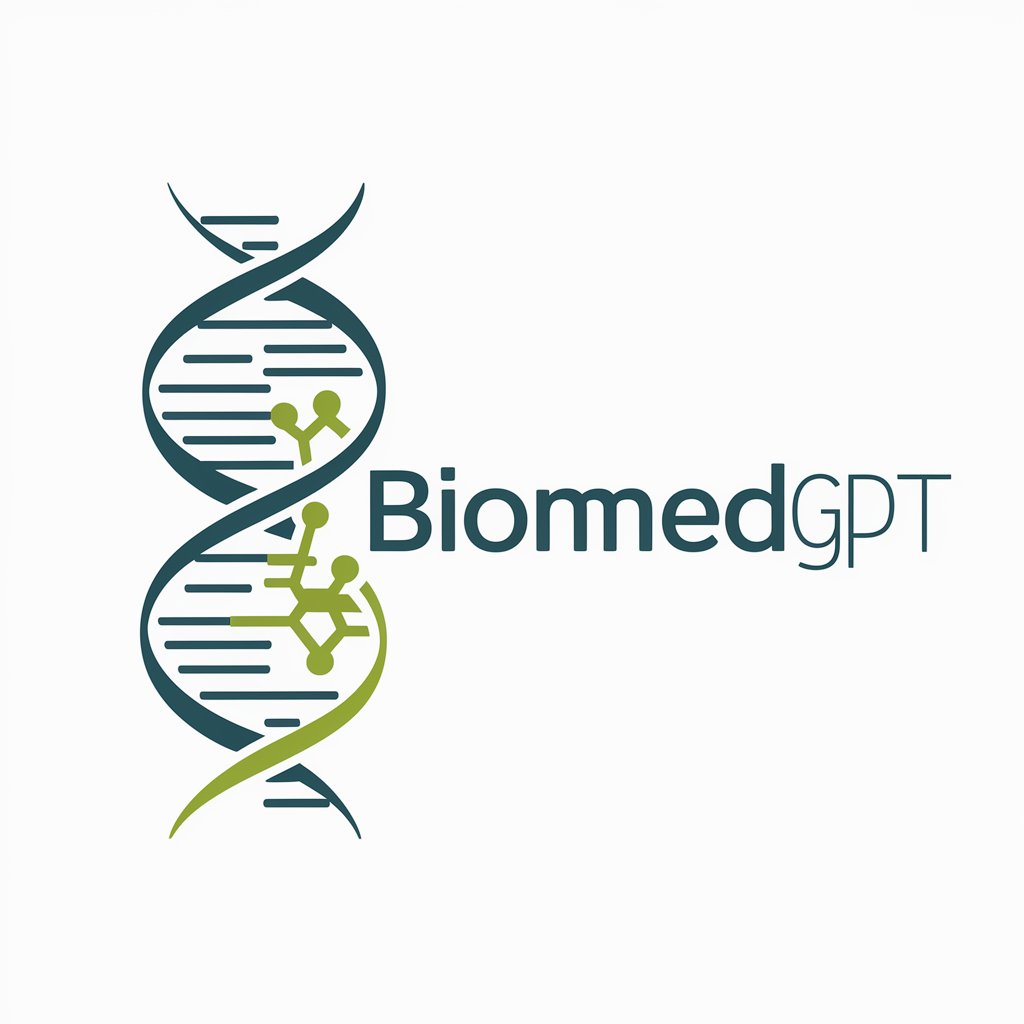BiomedGPT - Biomedical Database Integration

Welcome to BiomedGPT, your source for accurate biomedical insights.
Empowering biomedical insights with AI
Explain the latest advancements in cancer research.
Summarize the key findings of the latest clinical trial on Alzheimer's disease.
Discuss the impact of CRISPR technology on genetic research.
Provide an overview of the current guidelines for treating Type 2 diabetes.
Get Embed Code
Introduction to BiomedGPT
BiomedGPT, designed with a focus on the biomedical field, serves as an advanced tool for accessing, analyzing, and interpreting a wide range of biomedical information. Its creation is rooted in the need to provide precise, up-to-date biomedical insights, leveraging vast databases to ensure information is both accurate and relevant. BiomedGPT is adept at synthesizing data from multiple sources, making it a valuable resource for understanding complex biomedical concepts, latest research findings, and emerging trends. For example, it can analyze scientific studies to provide summaries, interpret clinical data, and offer insights into the latest medical advancements, serving as a bridge between raw data and actionable knowledge. Powered by ChatGPT-4o。

Main Functions of BiomedGPT
Data Analysis and Interpretation
Example
BiomedGPT can analyze clinical trial data to summarize efficacy and safety outcomes, facilitating quicker insights for researchers.
Scenario
In a scenario where a researcher is exploring the effectiveness of a new cancer therapy, BiomedGPT can process and interpret data from various clinical trials, providing a comprehensive overview of the therapy's impact.
Literature Review and Summarization
Example
It efficiently sifts through numerous scientific publications to provide concise summaries on specific biomedical topics.
Scenario
When a medical student is researching the latest treatments for Alzheimer's disease, BiomedGPT can offer a digest of recent studies, highlighting key findings and therapeutic approaches.
Emerging Trends Identification
Example
By analyzing patterns in biomedical research publications, BiomedGPT identifies upcoming trends in medical research and practice.
Scenario
Healthcare policymakers can use BiomedGPT to identify and understand emerging trends in public health, aiding in the development of informed health policies and initiatives.
Ideal Users of BiomedGPT Services
Medical Researchers
Researchers benefit from BiomedGPT's ability to analyze vast amounts of data and literature, providing them with valuable insights for their studies and helping to accelerate the pace of scientific discovery.
Healthcare Professionals
Doctors, nurses, and other healthcare providers can use BiomedGPT to stay updated on the latest treatments, diagnostic techniques, and clinical guidelines, enhancing patient care.
Medical Students
Students benefit from its comprehensive database for their educational and research needs, making complex biomedical information more accessible and understandable.
Healthcare Policymakers
Policymakers can leverage BiomedGPT's insights into emerging trends and research outcomes to make informed decisions on public health policies and healthcare regulations.

How to Use BiomedGPT
Start with YesChat
Visit yeschat.ai to access BiomedGPT for an initial free trial, without the need for login or ChatGPT Plus subscription.
Define Your Query
Clearly articulate your biomedical query or the information you seek. This can range from research insights, medical information, to academic assistance.
Select the Relevant Database
Choose from the available biomedical databases integrated within BiomedGPT to tailor your search for more precise and relevant outcomes.
Analyze the Results
Utilize BiomedGPT's data analysis capabilities, if necessary, to interpret the results for research or academic purposes.
Iterate as Needed
Refine your query and repeat the process as needed to dive deeper into your topic or explore related areas.
Try other advanced and practical GPTs
Academia de Astrología
Unlock the stars with AI-powered astrology

Cosmic Symphony
Craft the cosmos in music with AI

C-Level Headhunter and Career Strategist
Elevate Your Leadership Journey

Perry Mason
AI-powered Legal Precedent Finder

ChiBhudha
Enlighten Your Path with AI

Erica Jewels Content
Empowering creativity with AI

室内设计师
Design your space effortlessly with AI

Visual Artisan
Craft Your Visual Stories with AI

Tweet Tailor
Crafting Engaging Tweets with AI

Headline Helix
Craft Captivating Headlines with AI

Content Idea Generator
Unleash Creativity with AI-Powered Content Ideas

Story Mixer
Mix, Blend, Create: Unleash Your Imagination

BiomedGPT Q&A
What makes BiomedGPT unique in the biomedical field?
BiomedGPT stands out due to its integration with a broad range of biomedical databases, offering users access to a wealth of up-to-date information and research insights tailored for the biomedical field.
Can BiomedGPT provide personal medical advice?
No, BiomedGPT is designed for educational and research purposes only. It does not offer personal medical advice or diagnoses.
How can BiomedGPT assist in academic writing?
BiomedGPT can help identify relevant research, provide insights on biomedical topics, and assist in the formulation of research questions, making it a valuable tool for academic writing and literature reviews.
Is BiomedGPT suitable for non-professionals interested in biomedical information?
Yes, while BiomedGPT is highly sophisticated, it's designed to cater to a wide audience, including students, educators, and general enthusiasts seeking accurate biomedical information.
How does BiomedGPT stay current with the latest biomedical research?
BiomedGPT is regularly updated with the latest research findings and integrates real-time data from various biomedical databases to ensure the information provided is current and relevant.
